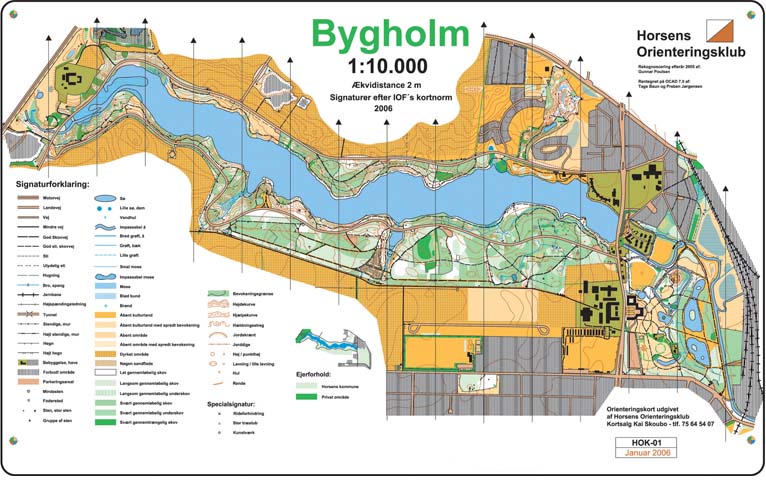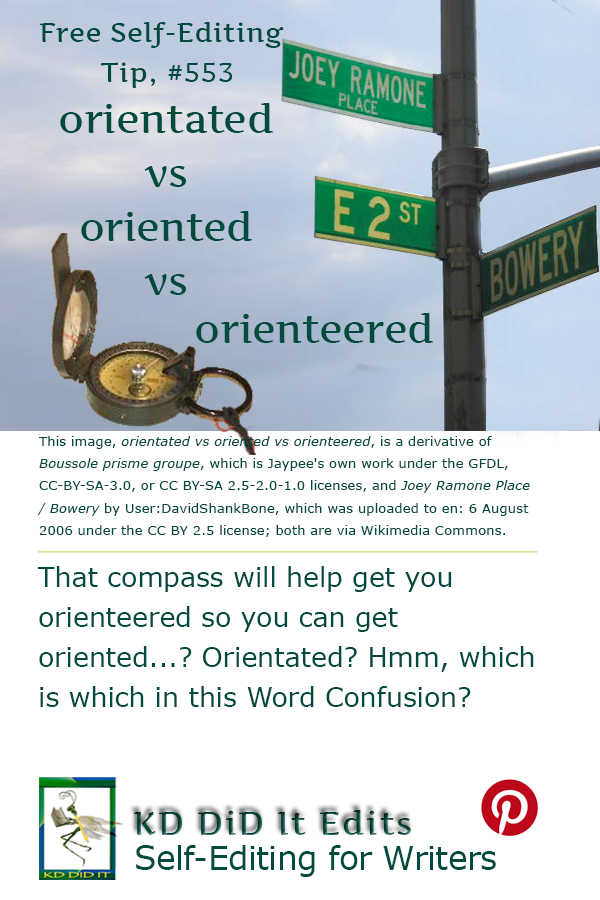In a book I was reading, one of the characters was editing some paperwork, and she was annoyed that the writer didn’t know the difference between orientate and orient, so I got curious.
Turns out she should have left well enough alone, as there is no real difference other than country of use. In the UK, people use orientate, while in the US, people use orient. No biggie; you can use either one. Although you may want to pay attention to dialogue, character, and/or setting and whether any of these three would have a British or American background you may wish to emphasize.
As a bit of background, Orient (as a noun) means the countries of east Asia, so a strict use of orient/orientate as a verb means to align yourself to the east. These days, either verb is more generally used to position yourself.
This post only addresses the verb definition.
Word Confusions . . .
. . . started as my way of dealing with a professional frustration with properly spelled words that were out of context in manuscripts I was editing as well as books I was reviewing. It evolved into a sharing of information with y’all. I’m hoping you’ll share with us words that have been a bête noire for you from either end.
If you found this post on “Orientated vs Oriented vs Orienteered” interesting, consider subscribing to KD Did It, if you’d like to track this post for future updates.
| Orientated | Oriented | Orienteered |
|---|---|---|
|
|
 — |
 |
| Part of Grammar: | ||
| Morpheme: orientate
Verb, intransitive & transitive Third person present verb: orientates |
Morpheme: orient
Verb, intransitive & transitive Third person present verb: orients |
Morpheme: orienteer
Verb, intransitive Third person present verb: orienteers |
| Chiefly British
See orient |
Chiefly American
Verb, intransitive: Align or position (something) relative to the points of a compass or other specified positions Verb, transitive: To familiarize a person with new surroundings or circumstances, or the like Establish one’s location To place in any definite position with reference to the points of the compass or other locations To direct or position toward a particular object To determine the position of in relation to the points of the compass
To place so as to face the east, especially to build (a church) with the chief altar to the east and the chief entrance to the west [Surveying] To set (the horizontal circle of a surveying instrument) so that readings give correct azimuths |
[Sport, individual] Take part in orienteering
Using a map and compass to find a way through unfamiliar territory |
| Examples: | ||
| Verb, intransitive: The fires are orientated in direct line with the midsummer sunset. Verb, transitive: She paused at the intersection and orientated herself. The lectures are designed to orientate the new students. The architect says she orientated the house to point north and south to take advantage of the views. It was orientated toward that house. In their religion, the church’s chief altar orientated east and the main entrance orientated west. Once a direct observation is made, we can orientate on that for additional measurements. |
Verb, intransitive: The fires are oriented in direct line with the midsummer sunset. “The ridges are oriented in the direction of the prevailing wind” (Jilbert). “The prayer was clearly oriented in a direction of hope and redemption” (Christianity). Verb, transitive: She paused at the intersection and oriented herself. The lectures are designed to orient the new students. The architect says she oriented the house to point north and south to take advantage of the views. It was oriented toward that house. In their religion, the church’s chief altar was oriented east and the main entrance oriented west. Once a direct observation is made, we can orient on that for additional measurements. |
Oh, George went orienteering with his buddies this weekend.
Paul and I orienteered over the summer months. We orienteered through the mountains. |
| Derivatives: | ||
| Adjective: orientational Noun: orientation Verb, transitive: reorientate, reorientated, reorientating |
Adjective: orient, oriental, self-oriented, well-oriented Adverb: orientally Noun: orient, the Orient, Orientalia, orientalism, orientalist, orientation, orienter Verb: orientalize |
Noun: orienteer, orienteering |
| History of the Word: | ||
| Mid-19th century, probably as a back-formation from orientation. | 1350–1400, Middle English from the Middle French, which is from the Latin orient- (stem of oriēns) the east, sunrise. | Alteration of Swedish orientering, from orientera meaning to orient is from the French orienter, which is from from orient meaning east. |
C’mon, get it out of your system, bitch, whine, moan . . . which words are your pet peeves? Also, please note that I try to be as accurate as I can, but mistakes happen or I miss something. Email me if you find errors, so I can fix them . . . and we’ll all benefit!
Satisfy your curiosity about other Word Confusions on its homepage or more generally explore the index of self-editing posts. You may also want to explore Book Layout & Formatting Ideas, Formatting Tips, Grammar Explanations, Linguistics, Publishing Tips, the Properly Punctuated, Writing Ideas and Resources, and Working Your Website.
Resources for Orientated vs Oriented vs Orienteered
Some of these links may be affiliate links, and I will earn a small percentage, if you should buy it. It does not affect the price you pay.
Apple Dictionary.com
Christianity Today. 2000.
Dictionary.com: orient
Collins: orient
Jilbert, John. Geography (Basic Facts). HarperCollinsPublishers: 1992. <https://amzn.to/3XB4v5g>. Print.
Pinterest Photo Credits:
Boussole prisme groupe is Jaypee’s own work under the CC-BY-SA-3.0 and Joey Ramone Place / Bowery by User:DavidShankBone was uploaded to en: 6 August 2006 under the CC BY 2.5 license; both are via Wikimedia Commons.
Revised as of 16 Apr 2024
By: Kathy Davie

